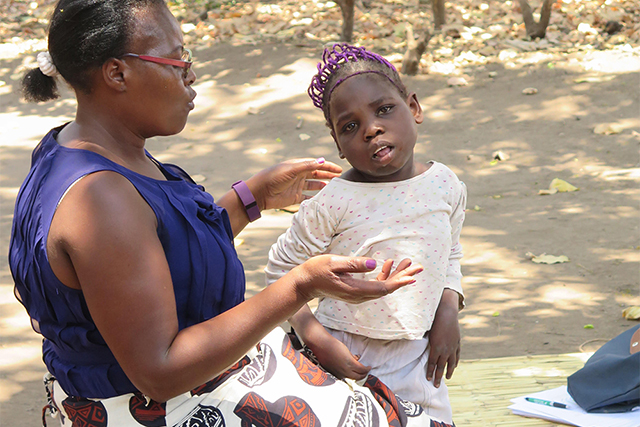
What motivates someone to work in the disability field?
Having a profound impact on people’s lives is a common driver, and that passion comes to life as longtime ICI friend Mikala Mukongolwa of Zambia sits down to talk about her two-week visit in the United States this month, the latest in a series of information exchanges with ICI that began in 2004.
“When I first came here, I saw people with significant support needs living full lives. They had help, but they were doing so much on their own,” she said. “In my country there are still kids and young men and women being kept, sometimes locked and bedridden, in houses with no interaction. They need to be loved and they can do a lot if we give them just a little bit of help.”
Dig a little deeper, however, and one discovers what first ignited that passion long ago: gratitude and inspiration.
Mukongolwa’s uncle lost his sight at age 7. At the time, her father was a young adult who had to leave Zambia for work opportunities in Zimbabwe. Before leaving, he found a school specializing in education for the blind and made sure his younger brother attended, over the objections of other family members. That uncle went on to graduate from law school and work at a university in Zambia, and in turn look after Mukongolwa after his brother died.
“He was a very good singer and composed many songs in braille,” she recalled. “He made me want to communicate in different ways and reach people.”
She became an elementary school teacher, but early into her career felt ineffectual as she tried to help one boy in first grade learn to write and accomplish other grade-specific skills.
“His parents weren’t concerned, but inside I knew my heart wouldn’t feel well if this boy sits in my class and learns nothing,” she said. She reached out to a nearby college of special education for help with a few teaching tasks for that one student, and the tips worked. So began her eventual special education coursework, which led to her home-based work with students with disabilities and her long association with ICI. Channeling her uncle, she invents and sings little songs to break down math and other subjects for young learners.
“We’ve learned a lot from Mikala’s mentoring strategies for new teachers, among other talents,” said ICI Executive Director Amy Hewitt. “Our work together gives us a foundational knowledge that keeps us grounded in the notion that you can’t simply export special education to every country without understanding the cultural context.”
What does she do that’s different?
“I’m very hands-on,” said Mukongolwa, pulling up a video on her phone of herself, down on the classroom floor, teaching a counting song to students with disabilities. “Most people who are head teachers go in looking very smart, and in high heels. I’m not that person. I show teachers what I do rather than tell them. Learning should be fun.”
ICI helps support Mukongolwa’s work as a way to extend the reach of its mission to create communities worldwide that more fully include people with disabilities.
During her most recent trip, Mukongolwa collaborated with ICI staffers working on a grant proposal to bring training for direct-support professionals to the post-secondary education market in Zambia.
Mukonglawa was also invited to participate in sessions at the Therap national conference as a component of their Global Initiative. Therap is an online documentation system for service providers in health and human services fields and DirectCourse has been a long-time collaborator.
“A lot of teachers in my country ask me, ‘Where do you learn all this?’” Mukongolwa said. “We were the first [in Zambia] to come up with a child protection policy and to help parents better understand behaviors in their children with disabilities. All that knowledge came from DirectCourse. Without ICI, I would still be in the dark.”



